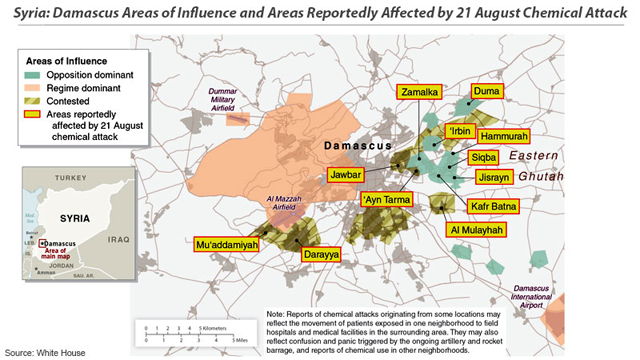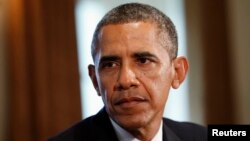WHITE HOUSE —
U.S. President Barack Obama says he continues to assess options for "limited, narrow" military action in response to the deadly chemical weapons attack in Damascus on August 21. President Obama spoke after Secretary of State John Kerry summarized a U.S. intelligence report he said confirms Syrian government responsibility.
Obama's remarks came in the White House Cabinet Room at the beginning of a meeting with the presidents of Estonia, Latvia and Lithuania.
He had met earlier with his national security advisers to assess options for a military response to the chemical attack in the Syrian capital.
Obama referred to the release earlier of the U.S. intelligence report that he said detailed with "high confidence" that the government of President Bashar al-Assad carried out the attack.
"This kind of attack is a challenge to the world. We cannot accept a world where women and children, and innocent civilians are gassed on a terrible scale,
he said. "This kind of attack threatens our national security interests, by violating well-established international norms against the use of chemical weapons."
Obama discussed limitations on any action he may decide upon.
"In no event are we considering any kind of military action that would involve boots on the ground, any long-term campaign, but we are looking at the possibility of a limited, narrow, act that would help make sure that not only Syria but others around the world understand that the international community cares about maintaining this chemical weapons ban and norm," he said.
Obama knows there is war weariness in the United States, Britain and elsewhere. The president referred to what he called "a certain suspicion" about any military action in the wake of the Iraq war.
But he said the scale of the chemical attack in Syria demands action.
"Part of our obligation as a leader in the world is making sure that when you have a regime that is going to use weapons that are prohibited by international norms on their own people, including children, that they are held to account," he said.
Full Obama statement:
Earlier, Secretary Kerry accused Syrian President Bashar al-Assad of a "crime against conscience and humanity," saying intelligence shows Syrian government knowledge of the attack.
"We know that for three days before the attack, the Syrian regime's chemical personnel were on the ground, in the area, making preparations," he said. "And we know that the Syrian regime elements were told to prepare for the attack by putting on gas masks, and taking precautions associated with chemical weapons. We know these were specific instructions."
Kerry said the United States knows that chemical-laden rockets came only from regime-controlled areas, and went only to opposition-controlled or contested neighborhoods.
Full Kerry statement:
The U.S. intelligence report says a senior regime official knew about the attack and confirmed that chemical weapons were used, reviewed the impact, and was afraid they would be discovered.
Kerry said at least 1,429 Syrians were killed, including at least 426 children.
Syria denies carrying out chemical attacks, including what the U.S. said was a smaller scale attack earlier in the year, and accuses rebels of using such weapons on Syrian soldiers.
Kerry said the U.S. intelligence community has high confidence in all the things it knows, and said the question now is what America and the world will do about it.
"We need to ask what is the risk of doing nothing? It matters because if we choose to live in a world where a thug and a murderer like Bashar al-Assad can gas thousands of his own people with impunity, even after the United States and its allies said no, and then the world does nothing about it, there will be no end to the test of our resolve and the dangers that will flow from those others who believe that they can do as they will," he said.

President Obama faces pressure from members of Congress to allow a vote on any military action. Polls show many Americans oppose or are skeptical about any military response.
Obama said Friday that consultations will continue with U.S. lawmakers.
Two former U.S. presidents have weighed in. Former Republican president George W. Bush said Obama has a "tough choice to make".
Former Democratic president Jimmy Carter said a punitive military response would be illegal under international law and "only harden existing positions and postpone a sorely needed political process" in Syria.
Obama's remarks came in the White House Cabinet Room at the beginning of a meeting with the presidents of Estonia, Latvia and Lithuania.
He had met earlier with his national security advisers to assess options for a military response to the chemical attack in the Syrian capital.
Obama referred to the release earlier of the U.S. intelligence report that he said detailed with "high confidence" that the government of President Bashar al-Assad carried out the attack.
"This kind of attack is a challenge to the world. We cannot accept a world where women and children, and innocent civilians are gassed on a terrible scale,
he said. "This kind of attack threatens our national security interests, by violating well-established international norms against the use of chemical weapons."
Obama discussed limitations on any action he may decide upon.
"In no event are we considering any kind of military action that would involve boots on the ground, any long-term campaign, but we are looking at the possibility of a limited, narrow, act that would help make sure that not only Syria but others around the world understand that the international community cares about maintaining this chemical weapons ban and norm," he said.
Obama knows there is war weariness in the United States, Britain and elsewhere. The president referred to what he called "a certain suspicion" about any military action in the wake of the Iraq war.
But he said the scale of the chemical attack in Syria demands action.
"Part of our obligation as a leader in the world is making sure that when you have a regime that is going to use weapons that are prohibited by international norms on their own people, including children, that they are held to account," he said.
Full Obama statement:
Earlier, Secretary Kerry accused Syrian President Bashar al-Assad of a "crime against conscience and humanity," saying intelligence shows Syrian government knowledge of the attack.
"We know that for three days before the attack, the Syrian regime's chemical personnel were on the ground, in the area, making preparations," he said. "And we know that the Syrian regime elements were told to prepare for the attack by putting on gas masks, and taking precautions associated with chemical weapons. We know these were specific instructions."
Kerry said the United States knows that chemical-laden rockets came only from regime-controlled areas, and went only to opposition-controlled or contested neighborhoods.
Full Kerry statement:
The U.S. intelligence report says a senior regime official knew about the attack and confirmed that chemical weapons were used, reviewed the impact, and was afraid they would be discovered.
Kerry said at least 1,429 Syrians were killed, including at least 426 children.
Syria denies carrying out chemical attacks, including what the U.S. said was a smaller scale attack earlier in the year, and accuses rebels of using such weapons on Syrian soldiers.
Kerry said the U.S. intelligence community has high confidence in all the things it knows, and said the question now is what America and the world will do about it.
"We need to ask what is the risk of doing nothing? It matters because if we choose to live in a world where a thug and a murderer like Bashar al-Assad can gas thousands of his own people with impunity, even after the United States and its allies said no, and then the world does nothing about it, there will be no end to the test of our resolve and the dangers that will flow from those others who believe that they can do as they will," he said.

President Obama faces pressure from members of Congress to allow a vote on any military action. Polls show many Americans oppose or are skeptical about any military response.
Obama said Friday that consultations will continue with U.S. lawmakers.
Two former U.S. presidents have weighed in. Former Republican president George W. Bush said Obama has a "tough choice to make".
Former Democratic president Jimmy Carter said a punitive military response would be illegal under international law and "only harden existing positions and postpone a sorely needed political process" in Syria.













